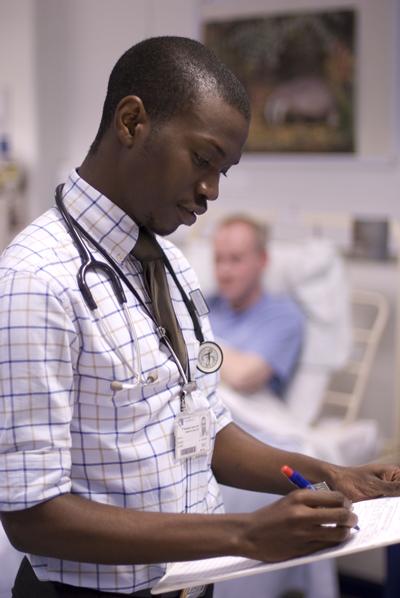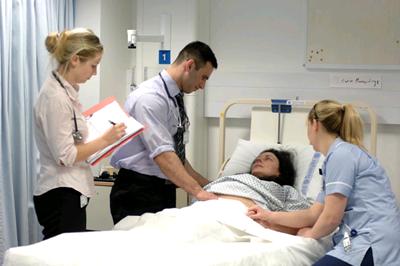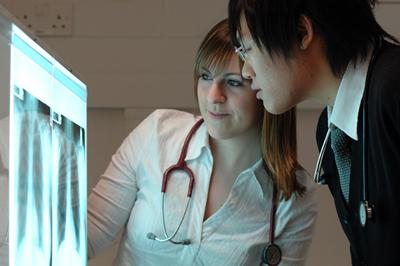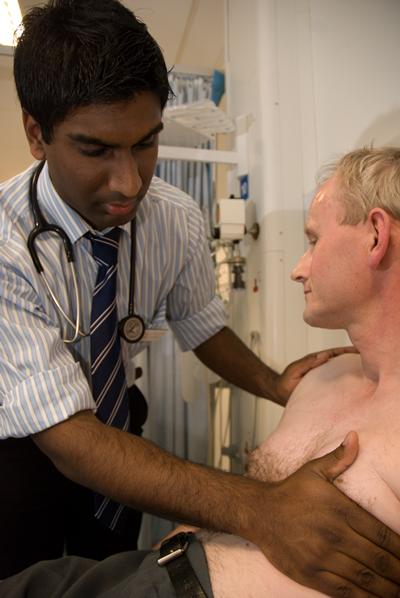We asked medicine students what advice they could give to help you get on well during your time in clinical placement and offer their answers to you as a 'survival guide'. This is what they said in their own words.
Natalie suggests that you...
Try and stay on top of reading up on things that you've seen, keep your notes together Because it's so easy to build up a stack of things that you're meant to look at but haven't got round to yet. Just be honest. Because, you know, patients ask you questions, and you're still connecting to them on a human level. You don't have to be in the doctor role yet. So it's all about learning how to talk to people. It is quite important for them to trust you.
Anna advises students that...
People say ward rounds are not important, but I think ward rounds are a good way to learn. Even though they are really draggy, whatever your consultant says to the patient during ward rounds, or during a clinic, it is actually very, very useful. I think these are the things that you can't be bothered to read in a text book, but when your consultant says this it actually clicks. And don't do the minimum but try to put in more effort. The more effort you put in, you will actually learn more at the end of the day, and you will be more confident, rather than just doing what is required and getting it signed off.
Camilla says to...
Make your own opportunities, don't just wait for them to be handed to you, because they might be or they might not be. If you're not doing anything, don't just slope off to the library, try and find something clinical to do, because you learn so much more. Don't try and overload yourself; pick one thing for that day that can be your learning task for that day, and learn all about it. And then just leave it, do something else. You need to have a break. Try and show an interest. Tell your consultant that you want to be a surgeon but don't burn yourself out.
Abigail points out that...
Even if you're not a very confident person, take that step and immerse yourself from week one, and follow a junior doctor around. At the end of the day, the worst that you're gonna do is ask the wrong questions and feel a bit of an idiot, but actually it isn't the end of the world, so just give it a go. You get so caught up at the time over the consequences, but actually if you take a step back there aren't any consequences of us asking the wrong questions. All that's gonna happen is we're not gonna be able to say to the doctor, "I think this is what it is," and the doctor will have to go and do it again. Just do it, don't think about it.
Sarah suggests to...
Be a bit proactive, and be confident when you come onto a ward, and get things going quite quickly. Don't sort of stand around and look bored.
Akma suggests to always...
Be prepared. Just have a rough idea of what the patient might come. You won't be shocked when you are at the hospital if you know a bit about patients' illnesses. And then the rest, you just have to learn it in the hospital. And be prepared about the knowledge that you have to learn during your first and second year, because you will use them. Because when you learn about something, the knowledge will really stick in your mind, because you do really see it in the hospital.
Taine says it's a good idea to...
Try finding out what each attachment is about. Always be open-minded. And never be afraid to ask questions. Manage your time efficiently. Be very comfortable about how to speak to a patient, and examining a patient, so make sure that's your main aim for the whole year.
Adil says that...
If you're in the way, it's OK, that just happens, and it's alright. You realise that it's just part of it. And, just take any opportunity that is given to you. So even if you know that something's gonna go badly, just take it.
Rose recommends that you...
Enjoy it. You're gonna meet people you're not gonna like. You're gonna have teachers that you don't like. You're gonna have situations that are gonna make you feel absolutely crap. And even patients can make you feel horrible. So you're gonna get it from all angles, but it's trying to just get past that, knowing that you're not meant to know everything, go easy on yourself, and have fun. Enjoy being with the patients, enjoy learning about this subject.
Luella advises students to...
Always speak up. And make sense of your timetable as soon as you get it. If there's anything you don't understand, speak up. Always be observant with what's going on. Any opportunity you have to assist or do anything practical, just get involved and don't be scared. If you feel you're wasting your time, you should do something better with the time. Don't just stand around and wait for doctors to tell you what to do. Take responsibility of your learning. And get other groups going outside of placement to reinforce learning. See and talk to as many patients as possible.



